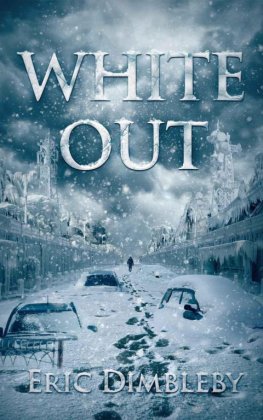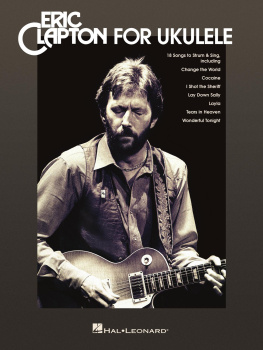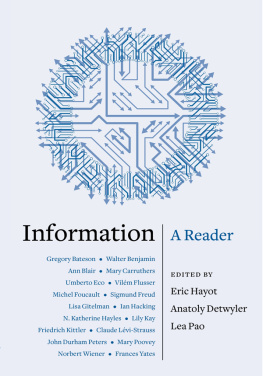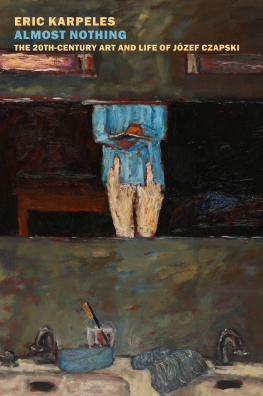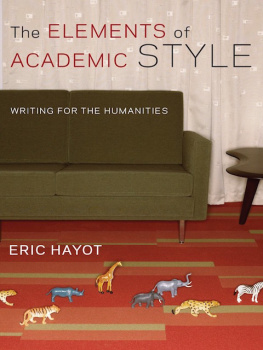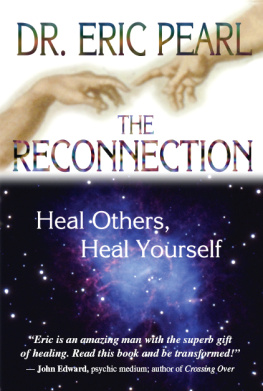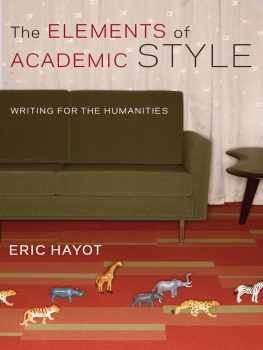Hayot Eric - Persistent Forms
Here you can read online Hayot Eric - Persistent Forms full text of the book (entire story) in english for free. Download pdf and epub, get meaning, cover and reviews about this ebook. City: New York, year: 2015, publisher: Fordham University Press, genre: Romance novel. Description of the work, (preface) as well as reviews are available. Best literature library LitArk.com created for fans of good reading and offers a wide selection of genres:
Romance novel
Science fiction
Adventure
Detective
Science
History
Home and family
Prose
Art
Politics
Computer
Non-fiction
Religion
Business
Children
Humor
Choose a favorite category and find really read worthwhile books. Enjoy immersion in the world of imagination, feel the emotions of the characters or learn something new for yourself, make an fascinating discovery.

- Book:Persistent Forms
- Author:
- Publisher:Fordham University Press
- Genre:
- Year:2015
- City:New York
- Rating:3 / 5
- Favourites:Add to favourites
- Your mark:
- 60
- 1
- 2
- 3
- 4
- 5
Persistent Forms: summary, description and annotation
We offer to read an annotation, description, summary or preface (depends on what the author of the book "Persistent Forms" wrote himself). If you haven't found the necessary information about the book — write in the comments, we will try to find it.
Persistent Forms — read online for free the complete book (whole text) full work
Below is the text of the book, divided by pages. System saving the place of the last page read, allows you to conveniently read the book "Persistent Forms" online for free, without having to search again every time where you left off. Put a bookmark, and you can go to the page where you finished reading at any time.
Font size:
Interval:
Bookmark:
Persistent Forms
VERBAL ARTS :: STUDIES IN POETICS
Lazar Fleishman and Haun Saussy, series editors

Copyright 2016 Fordham University Press
All rights reserved. No part of this publication may be reproduced, stored in a retrieval system, or transmitted in any form or by any meanselectronic, mechanical, photocopy, recording, or any otherexcept for brief quotations in printed reviews, without the prior permission of the publisher.
Fordham University Press has no responsibility for the persistence or accuracy of URLs for external or third-party Internet websites referred to in this publication and does not guarantee that any content on such websites is, or will remain, accurate or appropriate.
Fordham University Press also publishes its books in a variety of electronic formats. Some content that appears in print may not be available in electronic books.
Visit us online at www.fordhampress.com.
Library of Congress Cataloging-in-Publication Data
Persistent forms : explorations in historical poetics / edited by Ilya Kliger and Boris Maslov. First edition.
pages cm. (Verbal arts: studies in poetics)
Includes bibliographical references and index.
ISBN 978-0-8232-6485-8 (hardback)
1. PoeticsHistory. 2. Literature and history. I. Kliger, Ilya, editor. II. Maslov, Boris, 1982 editor.
PN1035.P46 2015
808.1dc23
2015015745
Printed in the United States of America
18 17 16 5 4 3 2 1
First edition
CONTENTS
One day someone will look back at the last few decades of U.S. literary criticism and remark on the strange trajectory of the category of the universal. Beginning with the reaction against structuralism, that person will observe a strong conceptual and rhetorical preference for multiplicity, diversity, and smallness across the major categories of the field. Among the many examples of this trend we can include the antagonism toward grand narratives, the postcolonial emphasis on hybridity, the resistance to Marxist models of totality (synonymous, briefly, with totalization) or to masculine models of desire seen in French feminism and queer theory (sex is emphatically not one), the deconstructive emphasis on systemic instability, a shift from polar (binary) categorization to the frameworks involving fields or continuums, and a general preference for pluralization (modernisms, not modernism, and so on), all of which assert against the totalizing or the ideal ontological diversity of things. All this ferment enfolded and was enfolded in turn by a consistent emphasis on the minor or the small, in practices of reading and in the adjudication of evidence, which picked up on the history of new critical close reading (and came prior, then, to post-structuralism). The critique of the general or the large received one remarkably influential elaboration in Deleuze and Guattaris book on Kafka, in which minor literature was the best literature of all; then and later, it was sustained through deconstruction, psychoanalysis, and the new historicism, each of which endowed small or seemingly inconsequential units of culture or meaning with immense cultural force, in a pattern that over and over again aimed to reduce or destroy the hierarchies of culture that would have otherwise relegated those units to irrelevance.
All this together amounted to a revolution in the history of epistemology, at least in the American academy. It helps explain the especially American desuetude of methods like narratology or genre analysis, as well as the relative lack of long-term influence of the major syncretic works of twentieth-century literary criticism, including those of figures like Erich Auerbach, Ernst Robert Curtius, Georg Lukcs, Lucien Goldmann, or Northrop Frye. The history of the reception of the most influential of these critics for that period, Mikhail Bakhtin, may serve to indicate its spirit: setting aside his broadest historical impulses, Bakhtins reception prized those concepts of his most congenial to the anti-universalizing spirit of the agedialogism, heteroglossia, and the carnivalesque laughter that destroys self-important categorization.
That the categories needed to be destroyed, the grand narratives put under suspicion, that everywhere the small or the particular, in all its idiographic brilliance, needed to shine its odd light through the depths and hollows of normative common sense: this is undeniable. The question before us now is whether it is possible to return to the broad and the general with these lessons in mind; or whether those idiographic impulses are so absolute, so correct in their critique of the general, that any attempt to undo them will invite a tragic return of the Enlightenments worst, most phallic aggressions. In other words: Is large-scale literary historical criticism possible again today? And, if so, on what terms?
The book in your hands is one attempt to answer those questions. It returns to a tradition that includes in its direct and indirect lineage figures like Bakhtin and Lukcs, but goes backat least hereto the work of the nineteenth-century Russian philologist and scholar Alexander Veselovsky (18381906), who called his method historical poetics.
What historical poetics was for Veselovsky matters less throughout the book than what contemporary critics might do with the concept. For now, let us loosely describe it as an attempt to practice literary criticism in large historical scales, while not forgoing the necessity of a deep familiarity with individual works (and pieces of works) and their immediate contexts (and pieces of contexts). Please assume that, like all methods, historical poetics carries with it a theory of aesthetic becoming, of culture and its relation to social and economic history, of the historical ontology of the work of art, a refined understanding of the relationship between the universal and the particular, and an awareness of the recursions that mutually modify the act of interpretation and the identification of evidence.
Those assumptions in hand, it becomes possible to read this collection of essays as an attempt to simultaneously imagine and exemplify a method whose principles and practices are still in formation. Whether or not historical poetics appeals to you will depend on whether you find the imagination compelling and the examples believable. First, will the descriptions of the ways in which historical poetics might finesse some of the critical problems that face us today strike you as having any intellectual potential? Second, will the readings, playing fairly and well with the evidence, teach you something that you didnt already know (or wish you knew) about the material they consider?
This book is not, then, a manifesto, but an experiment, or rather, a series of experiments. No single historical poetics emerges from its pages. The energy it emits testifies instead to a set of possibilities and openings, lines of consolidation and flight.
Among other things this energy highlights three ongoing methodological problems for literary criticism, most easily invoked by their conventional binary formulations: freedom and necessity; universality and particularity; future and present.
FREEDOM AND NECESSITY
The recent critiques of the near-total dominance of idiographic or close methods of literary criticism, whose most obvious avatar has been Franco Moretti, have made us aware of the ways in which our practices of reading shape the kinds of claims we tend to make about literary objects. Someone who close reads, Moretti has suggested, will naturally tend to develop a practice of criticism focused on a relatively narrow canon of works whose density of signification lends itself well to that methodand will probably, then, also develop theories of literariness and literary history that follow from it. We may from this perspective recognize that the widely accepted belief that the smallest scales of the text best escape the formative power of cultureand thus point us to literatures liberatory potentialis an ontology of literature appropriate to the method that such a belief develops (namely, then, close reading).
Next pageFont size:
Interval:
Bookmark:
Similar books «Persistent Forms»
Look at similar books to Persistent Forms. We have selected literature similar in name and meaning in the hope of providing readers with more options to find new, interesting, not yet read works.
Discussion, reviews of the book Persistent Forms and just readers' own opinions. Leave your comments, write what you think about the work, its meaning or the main characters. Specify what exactly you liked and what you didn't like, and why you think so.

